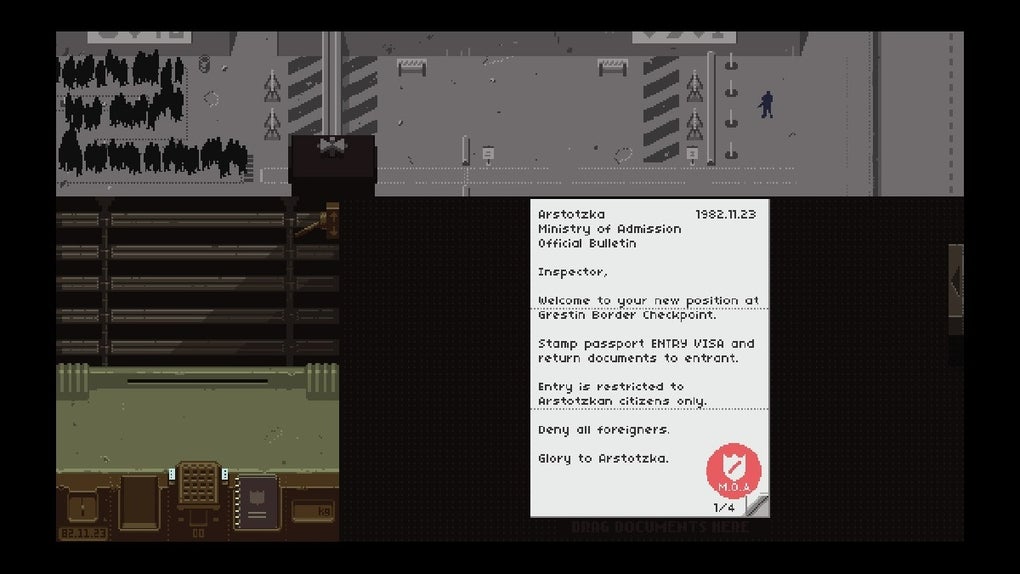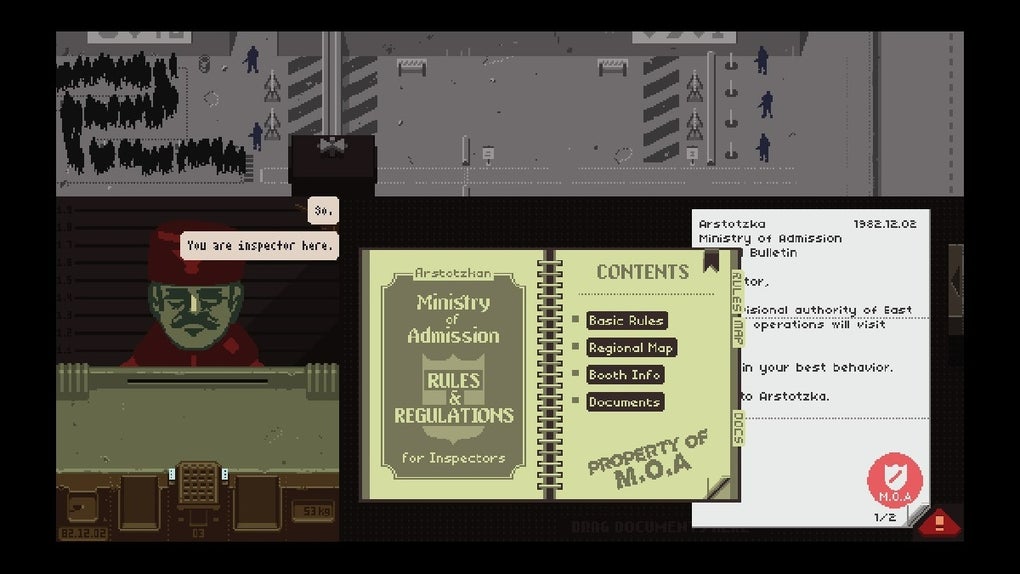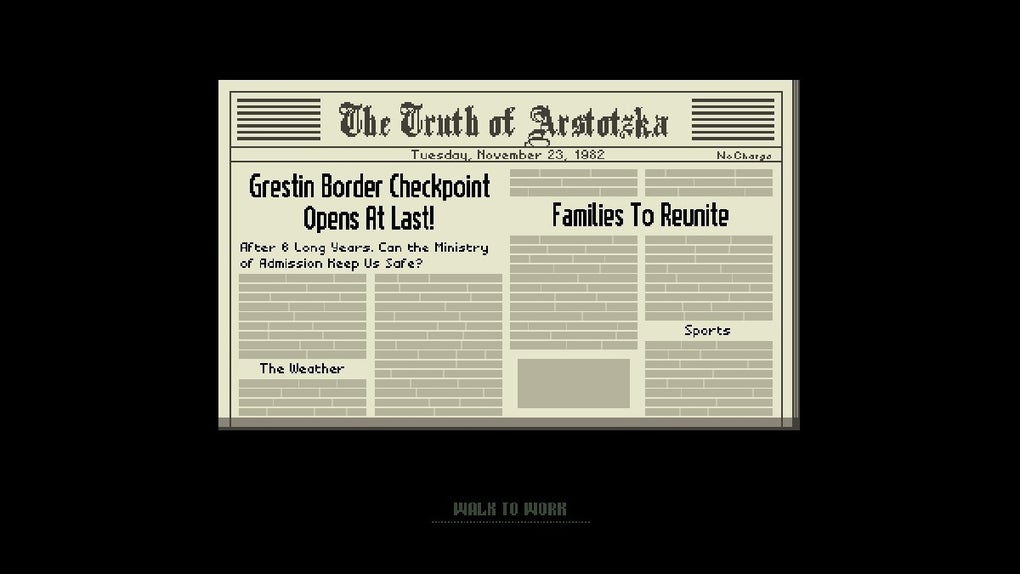Papers, Please, developed by Lucas Pope, is not your typical role-playing game. It eschews high-octane action and fantastical settings in favor of a meticulously crafted simulation of an immigration inspector’s life in a fictional, dystopian, Soviet-style state called Arstotzka. Set in 1982, amidst the chilling backdrop of the Cold War, the game thrusts players into a morally complex world where every decision, no matter how small, carries significant weight. This isn’t a game about slaying dragons or conquering kingdoms; it’s a game about navigating the bureaucratic labyrinth of a totalitarian regime and the devastating consequences of your choices.
The Grueling Routine of a Border Inspector
The core gameplay loop of Papers, Please revolves around meticulously examining the documents of individuals attempting to cross the border into Arstotzka. As the newly appointed immigration inspector, you’re presented with a steady stream of citizens, both returning natives and foreign nationals, each carrying a collection of papers: passports, visas, permits, work passes, and more. Your task is to verify the authenticity of these documents, comparing details, checking for inconsistencies, and ultimately deciding whether to grant or deny entry.
The initial days are deceptively simple. The rules are relatively straightforward, and the pressure is low. However, as the game progresses, the regulations become increasingly complex and convoluted. New laws are introduced daily, often contradicting or modifying previous ones. This constant influx of information keeps players on their toes, demanding constant vigilance and attention to detail. A single oversight, a misplaced stamp, or a missed detail can result in dire consequences – fines that dramatically impact your meager income, jeopardizing your ability to provide for your family.

The game’s mechanics are deceptively simple yet deeply engaging. You’re equipped with a desk, a stamp, and a set of regulations that you must meticulously follow. Each individual’s documents must be thoroughly scrutinized, with a focus on identifying forgeries, expired documents, and any discrepancy that could signal an attempt to subvert the rules. Fingerprinting technology is introduced later, adding another layer of complexity to the process, requiring you to cross-reference fingerprints with existing databases to verify identities.
Navigating Moral Dilemmas and Ethical Conflicts
While the core gameplay loop focuses on procedural accuracy, Papers, Please transcends simple document verification. The game’s strength lies in its exploration of moral ambiguity and the ethical dilemmas faced by the player. The game’s setting creates a fertile ground for exploring difficult themes of compliance, corruption, compassion, and the devastating human cost of oppression.
You’re not simply following rules; you’re making life-altering decisions for the people before you. You encounter individuals desperate to enter the country, each with their own unique story and compelling reason. Some are fleeing persecution, others are seeking economic opportunity, and still others are attempting to smuggle contraband or engage in illicit activities. The game forces you to confront the human cost of your decisions, presenting you with situations that challenge your moral compass and test your ability to balance compassion with adherence to the law.
Bribery becomes a recurring theme, with corrupt officials attempting to influence your decisions. Smugglers offer bribes for letting illegal goods pass through undetected, while checkpoint guards may offer extra money to detain more people, creating a system where bending the rules can help you to survive. Every decision has a consequence and the player is constantly reminded of this through the limited funds they have to take care of their family.

The daily score at the end of each day highlights the consequences of your decisions, tallying up your earnings, expenses, penalties, and bribes. This straightforward accounting provides a stark reminder of the financial precariousness of your situation and how your choices directly impact your family’s well-being.
The Weight of Responsibility and the Struggle for Survival
The game isn’t just about bureaucratic efficiency; it’s about survival. Your character, a newly appointed border inspector, is struggling to make ends meet. The salary is barely enough to cover the cost of rent, food, medicine, and heat for your family. Every penalty incurred for mistakes directly impacts your ability to feed and clothe your family, creating a high-stakes environment where the cost of compassion is all too real.
This aspect of the game adds another layer of complexity to the moral dilemmas. Do you risk a fine to help someone in need, or do you stick strictly to the rules, potentially condemning someone to hardship or even death, to ensure your family’s survival? The game constantly forces you to confront this agonizing trade-off, highlighting the inherent unfairness of the system and the impossible choices faced by those caught in its gears.
The narrative unfolds gradually, revealing the political machinations and underlying conflicts that fuel Arstotzka’s oppressive regime. This unfolding narrative is not explicit but emerges through the documents you process, the whispers of conversations in the background, and the ever-changing laws. This slow reveal is as much a part of the game as the daily routine of inspecting papers.
Beyond the Story Mode: Endless Challenges
Once you’ve completed the main story mode, Papers, Please offers an “Endless” mode, which provides a different kind of challenge. While lacking the narrative depth of the story mode, it allows players to test their skills in a variety of scenarios and under varying levels of pressure. These challenges include timed modes, endurance modes, and perfection modes, each presenting unique obstacles that test the player’s speed, accuracy, and ability to handle the pressure.
Endless mode is a testament to the game’s addictive nature. The simple, repetitive yet compelling nature of the gameplay loop and the challenge to perform under a range of conditions provides a compelling reason to return to this unique game repeatedly.
The Art of Storytelling Through Simple Mechanics

Papers, Please stands out for its unique aesthetic. The game’s graphics are deliberately minimalist, opting for a pixelated art style that enhances the atmosphere of a drab, oppressive regime. This stylistic choice enhances the game’s immersive quality, reinforcing the feeling of being entrenched in the grim reality of Arstotzka.
While the visuals may seem simple, the game’s true brilliance lies in its ability to evoke emotion and create compelling narratives through its mechanics. The weight of each decision, the financial strain of a mistake, and the desperation of the individuals seeking entry are all conveyed through the game’s unassuming yet effective gameplay.
Conclusion: A Masterclass in Moral Ambiguity and Compelling Gameplay
Papers, Please is more than just a game; it’s a powerful and thought-provoking experience. It masterfully utilizes simple mechanics to create a complex and emotionally resonant narrative. The game challenges players to confront difficult moral dilemmas, forcing them to consider the ethical implications of their actions and the human cost of obedience to an oppressive regime. While its minimalist visuals may not appeal to everyone, the game’s unique gameplay loop, gripping storyline, and exploration of complex moral issues make it a truly unforgettable and highly recommended game, particularly for those who enjoy gameplay that goes beyond simple action and rewards strategic thinking and moral introspection. It’s a game that will stay with you long after you’ve finished playing.
File Information
- License: “Full”
- Latest update: “June 26, 2025”
- Platform: “Windows”
- OS: “Windows XP”
- Language: “English”
- Downloads: “487.8K”
















